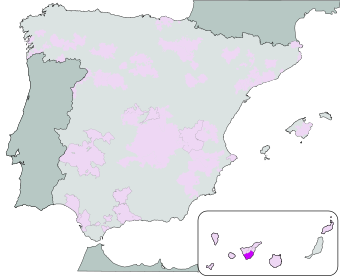Abona (DO) facts for kids
| Wine region | |

Abona DOP in the province of Santa Cruz de Tenerife in the region of Canary Islands
|
|
| Official name | D.O.P. Abona |
|---|---|
| Type | Denominación de Origen Protegida (DOP) |
| Year established | 1996 |
| Country | Spain |
| No. of vineyards | 898 hectares (2,219 acres) |
| No. of wineries | 19 |
| Wine produced | 5,608 hectolitres |
| Comments | Data for 2016 / 2017 |
Abona is a special area in Tenerife, Canary Islands, Spain. It's known for making delicious wine. This area has a special title called "Denominación de Origen Protegida" (DOP). This means its wines are protected and must follow strict rules. These rules make sure the wines are high quality and truly come from Abona. Abona got its DOP title in 1996.
Contents
Where Abona Is Located
The vineyards in Abona are found on the sunny southern coast of Tenerife. They are planted on the slopes of Teide, a very tall, old volcano. Teide is the highest mountain in Spain, reaching 3,715 meters (about 12,188 feet) high! The vineyards themselves are planted at different heights, from 200 meters (about 656 feet) up to 1,800 meters (about 5,905 feet).
The Soil in Abona
The soil where the grapes grow is very special. On the lower parts of the volcano's slopes, the soil has clay. It also contains limestone and marl. These types of soil are good for growing grapevines.
Abona's Climate
Because the Teide mountain is so tall, Abona has many different types of weather in a small area. This is called "microclimates." The Canary Islands usually have a warm, subtropical climate. But in Abona, things change a lot depending on how high up you are:
- Near the sea: It's hot and sunny here, with only a little rain.
- Mid-slopes (550 m to 1,200 m): This area is often in the clouds. It's more humid, gets more rain, and the temperatures are cooler.
- High up (above the clouds): It's much drier here. The temperature changes a lot between day and night. Snow is common, and it can get very cold, sometimes as low as -5°C (23°F).
Grape Varieties Grown Here
Many different types of grapes are allowed to be grown in Abona. These grapes are used to make the region's unique wines.
- Red Grapes: Bastardo Negro, Listán Negro, Listán Prieto, Malvasía Rosada, Moscatel Negro, Negramoll, Tintilla, Vijariego Negro, Cabernet Sauvignon, Merlot, Pinot Noir, Ruby Cabernet, Syrah, Tempranillo, Castellana Negra.
- White Grapes: Bastardo Blanco, Bermejuela, Forastera Blanca, Gual, Listán blanco de Canarias, Malvasía Aromática, Malvasía Volcánica, Moscatel de Alejandría, Pedro Ximénez, Sabro, Torrontés, Verdello, Vijariego, Albillo, and Doradilla.
In the past, grapevines were often planted as low bushes, which is called en vaso. But now, many new vineyards use trellises (en espaldera). Trellises are structures that support the vines as they grow.
See also
 In Spanish: Abona para niños
In Spanish: Abona para niños
 | Emma Amos |
 | Edward Mitchell Bannister |
 | Larry D. Alexander |
 | Ernie Barnes |

